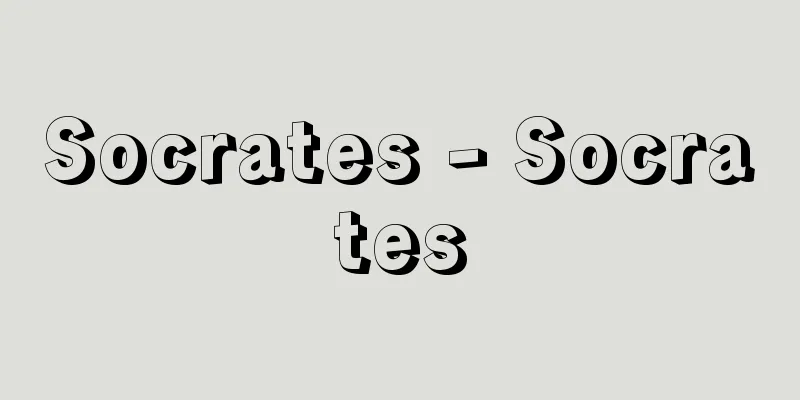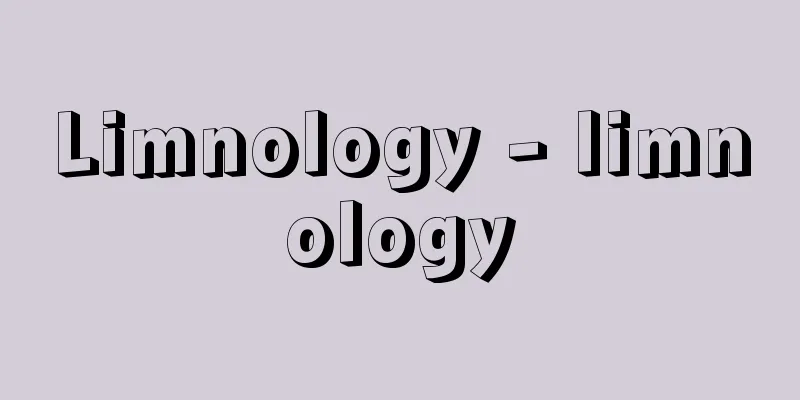Socrates - Socrates

|
An ancient Greek philosopher. Born in Athens. He preached the need to value one's "soul" (pschē), asked what was most important to oneself, and made it his job to engage in philosophical dialogues with the townspeople every day. Perhaps because of this work, he was accused of being jealous, tried, sentenced to death, and died by drinking a poisoned cup. The details of his trial, imprisonment, and death are detailed in the philosophical plays (Plato's dialogues) "Euthyphro," "Apology of Socrates," "Crito," and "Phaedo" written by his student Plato. The calm and clear attitude of Socrates as he faces death, depicted in these plays, cannot help but touch the hearts of readers as it shows the way a philosopher should be when faced with a serious matter that transcends life and death. Socrates did not write any books. We know him from the writings of several people around him, but there is a problem of who to believe and to what extent. This is called the "Socratic problem" in the history of philosophy. Usually, the image of Socrates conveyed by Plato, the most prominent philosopher among his disciples, is used as the framework, and other things are often added to it. We do not know for certain about his early years. We are familiar with the image of an elderly Socrates in the streets and gymnasiums of Athens, questioning beautiful young people, as well as the town's influential people, about what makes people happy, what is good, and what courage is (this is called the Socratic method of dialogue, or dialectic). The subject of these dialogues was often about practice. And these dialogues always ended with the two dialoguers admitting their ignorance by saying, "I still don't know that." In these cases, the dialoguers often got the impression that Socrates actually knew the answer despite what he said (Socratic irony), and in some cases, the people whose ignorance was exposed became angry at the sneaky nature of Socrates' methods. However, Socrates' true intention is to encourage each person to realize their ignorance of the ultimate ground by which their existence is given meaning, and to know that it is most important to question this. Of course, Socrates does not know this ground. Rather, Socrates' wisdom (philosophia) lies in realizing one's ignorance of the ultimate ground (knowledge of ignorance) and remaining in this "dead end" (aporia) through questioning it. It is about placing oneself in a position that is questioned from the root, and in this way being illuminated from the root as a whole. Socrates had an ugly face, bulging eyes, and a distorted, lion-like nose. But those who spoke with him were captivated by his words and captivated by what was inside him. In this contradiction between the outside and the inside lies the essence of his existence. Up until now, Greek philosophers had questioned the principles of the universe. With Socrates, the question of the self and the basis of the self became the subject of philosophy for the first time. In this sense, Socrates is the father of the philosophy of the inner self (the dimension of the soul). Also, in the sense that the question of the self is a question of the "invisible" (transcendence) that grounds the self, he is the father of metaphysics. However, for Socrates, the inner self was only shown as the journey of wisdom that remains endlessly in the "deadlock" that arises from being questioned by the basis. Thus, by placing the problem of "origin" revealed through the rift between the outside and the inside at the center of philosophical interest, with the proof of his life and death, Socrates became the man who bore the weight of Western philosophy on his own. [Nobuaki Kato January 20, 2015] "Socrates by Michitaro Tanaka (Iwanami Shinsho)" [References] | | | | |Source: Shogakukan Encyclopedia Nipponica About Encyclopedia Nipponica Information | Legend |
|
古代ギリシアの哲学者。アテネに生まれる。自分自身の「魂」pschēをたいせつにすることの必要を説き、自分自身にとってもっともたいせつなものは何かを問うて、毎日、町の人々と哲学的対話を交わすことを仕事とした。そして、おそらくはこの仕事のために嫉(そね)まれて告発され、裁判され、死刑の宣告を受け、毒杯を仰いで死んだ。裁判の模様と獄中および死去の場面は、弟子プラトンが書いた哲学的戯曲(プラトンの対話篇(へん))『エウチュプロン』『ソクラテスの弁明』『クリトン』『パイドン』の諸作品に詳しい。そこに描かれた、死に面するソクラテスの平静清朗な態度は、生死を越えた重大事に対面する哲学者のあり方を示すものとして、読む人の心にせつせつとして迫らずにはおかない。 ソクラテスは書物を書かなかった。その周囲にあった何人かの人が彼について書き、われわれはこれによって彼を知るが、そのうちのだれを、また、どこまで信ずべきかという点に問題があり、これを哲学史上「ソクラテス問題」という。通常は、弟子のなかでもっとも傑出した哲学者であるプラトンの伝えるソクラテス像を骨子とし、これに他のものを補うことが多い。 若いころのことについて、確かなことは知られない。われわれに親しいのは、年配のソクラテスがアテネの街角や体操場で美しい青少年を相手に、また町の有力な人々を相手に、人を幸福にするものは何か、善(よ)いものは何か、勇気とは何かと問いただしている姿である(これをソクラテスの問答法=ディアレクティケーという)。これらの問答の主題は、多くこのように実践に関するものであった。そして、この問答はいつも「まだそれはわからない」という無知の告白を問答者が相互に認め合うことで終わった。この際、相手は、ソクラテスがそういいながらも実は自分では知っているという印象をもつことが多く(ソクラテスのイロニー)、そこで自己の無知を露呈された人々は、ある場合、ソクラテスのやり口の陰険さに怒った。 しかし、ソクラテスの真意は、各人が自己の存在がそれによって意味づけられている究極の根拠についての無知を悟り、これを尋ねることをなによりもたいせつなことと知るように促すことにある。もとより、ソクラテスがこの根拠を知るというのではない。むしろ、究極の根拠についての無知を悟り(無知の知)、それへの問いかけを通じてこの「行き詰まり」(アポリア)のうちにとどまるところにソクラテスの愛知(フィロソフィアー=哲学)がある。それは根源から問いかけられるものとしての場に、己を置くことであり、このような方法で己が全体として根源から照らされることである。 ソクラテスの容貌(ようぼう)は醜く、両眼は突出し、鼻はひしゃげた獅子(しし)鼻であった。しかし彼と語り合った人はそのことばに魅せられ、その内面にあるもののとりこにされてしまった。この外と内の背反に、彼の存在の本質がある。 これまでのギリシアの哲学者は宇宙の原理を問うた。ソクラテスにおいて、初めて自己と自己の根拠への問いが哲学の主題となる。この意味において、ソクラテスは内面(魂の次元)の哲学の祖である。また、自己への問いは、自己を根拠づけている「見えないもの」(超越)への問いであるという意味では、彼は形而上(けいじじょう)学の祖である。ただソクラテスにおいては、内面は、根拠によって問いかけられるところから生ずる「行き詰まり」のうちにどこまでもとどまる愛知の道行きとしてだけ示されるものであった。こうして、ソクラテスは外と内との裂け目を通じて開示される「根源」の問題を哲学の関心の中心に、その生と死の証(あかし)をもって引き据えることにより、西洋哲学の重みを一身に負う人となった。 [加藤信朗 2015年1月20日] 『田中美知太郎著『ソクラテス』(岩波新書)』 [参照項目] | | | | |出典 小学館 日本大百科全書(ニッポニカ)日本大百科全書(ニッポニカ)について 情報 | 凡例 |
<<: Memories of Socrates - Apomnēmoneumata
>>: Continued Japanese Ojoden - Zokuhonchooujoden
Recommend
Arrow worm - Arrow worm
A general term (illustration) for invertebrates be...
Nishiaizu [town] - Nishiaizu
A town in Yama District, northwest of Fukushima Pr...
Caesarius
… Among the many biographies of saints, martyrs, ...
Theodoros (of Samos) (English spelling)
…The building was already considered an immortal ...
Quail mochi - Uzuramochi
…It is loved by the common people as a mochi swee...
Sled - sled
〘 noun 〙 A tool used to slide on snow or ice to ca...
Transantarctic Mountains
...The farthest point within the continent is cal...
Fescue
A general term for the genus Fescue of the Poaceae...
Canary palm (English spelling) Phoenix canariensis; Canary-palm
A tall tree of the palm family. Native to the Cana...
Solution pond - Kaichi
Please see the "Shie Pond" page. Source...
Dance
…In a newborn baby's head, the edges of the f...
American Free Trade Association
...The United States launched the Alliance for Pr...
Whiplash - Whiplash
A series of symptoms caused by whiplash injury, wh...
Ionon
C 13 H 20 O (192.30). A general term that include...
Ulothrix zonata (English spelling) Ulothrix zonata
…[Mitsuo Chihara]. . . *Some of the terminology t...






![Oki [town] - Ooki](/upload/images/67cb146978388.webp)


